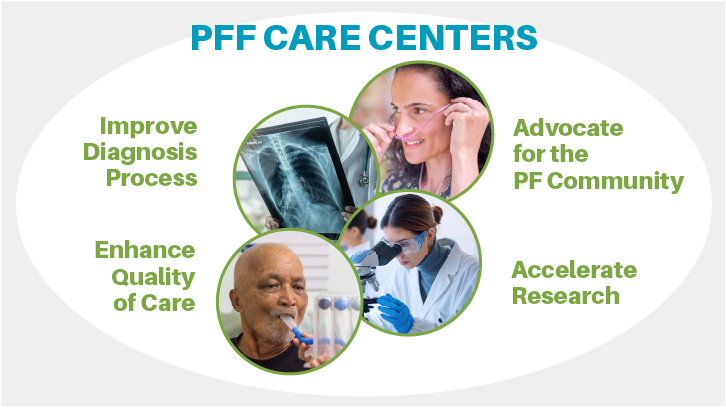PF Basics: Info for Newly Diagnosed Patients

Your medical care
Top takeaways
- A team of specialized healthcare providers, led by a pulmonologist, will treat your pulmonary fibrosis (PF) and educate you about your day-to-day care at home.
- The Pulmonary Fibrosis Foundation (PFF) Care Center Network includes medical centers across the nation with expertise in treating PF.
- Your doctor’s strategy for monitoring your PF may include a combination of symptom tracking, pulmonary function tests, walking tests, high-resolution scans of your lungs, and other tests. These tests are often repeated over time.
- When medically appropriate and permitted by state law, telemedicine visits can make it more convenient to see your healthcare providers, especially if you live far away.
Your core care team members
It takes various types of healthcare professionals to diagnose, treat, and care for people living with pulmonary fibrosis. When healthcare providers with different skills and specialties work together to care for patients, this is called a “multidisciplinary” approach to care.
Your core care team members may include the following:
- A pulmonologist, or lung doctor, diagnoses and treats diseases of the entire respiratory system. A pulmonologist will lead your unique care plan.
- PFF Care Centers (also see section below) and other medical facilities that specialize in interstitial lung disease (ILD)— the larger category of lung diseases that includes PF—will have an ILD nurse who has specific knowledge in caring for and educating people living with PF.
- A radiologist, a doctor who interprets medical imaging, will read and provide important information from X-rays, computed tomography (CT) scans, and high-resolution computed tomography (HRCT) scans of your lungs.
- A respiratory therapist may perform tests to measure how well your lungs are working, help you manage oxygen therapy if it’s prescribed, and guide you on breathing strategies and ways to manage daily tasks to minimize shortness of breath.
- PFF Care Centers often have a clinical care coordinator, a person who manages and facilitates your treatment plan, coordinating among your healthcare providers. A clinical care coordinator also may coordinate with community resources.


Other care team members
Depending on your type of PF or any related conditions you have, other members of your care team may include:
- A rheumatologist, who treats conditions of the joints, bones, muscles, and tendons,
and often helps lead care for patients with connective tissue disease or autoimmune disease; - A pathologist, who interprets lung biopsies to assist in specific diagnoses;
- A cardiologist, who specializes in problems of the heart and blood vessels;
- A genetic counselor, who can provide guidance on the benefits and risks of genetic testing if a genetic condition is suspected; and/or
- A social worker, who helps ensure you have the support services you need in the community and at home.
If you become a candidate for a lung transplant, a transplant team will include a surgeon, transplant coordinator, specialized nurses, infectious disease team, and others.
Throughout your PF journey, but especially at the beginning, it’s helpful to jot down your questions on paper or your smartphone before each healthcare appointment to make sure you discuss them with your doctor. You may want to start with the PFF’s list of initial questions to ask your doctor, and print out our physician notepad to help you take organized notes during your next appointment.
Finding the right healthcare provider
People newly diagnosed with PF often find it challenging to identify the right healthcare providers. The PFF is dedicated to promoting earlier recognition and diagnosis of PF to ensure that patients receive the highest-quality healthcare. Established in 2013, the PFF Care Center Network, or PFF CCN, includes healthcare institutions across the nation where people with PF can find experienced healthcare professionals who understand their disease, as well as support services to improve the quality of their lives. Care Centers use a multidisciplinary approach to deliver comprehensive patient care, participate in patient-oriented PF research with a focus on clinical trials, and work with the PFF to provide educational materials and engage the local community through PFF programs and advocacy.
The PFF CCN has expanded to also include Clinical Associates. Clinical Associate members are community-based healthcare institutions that partner with Care Centers to share resources to which they may not otherwise have access. Through the CCN, Care Centers and Clinical Associates jointly promote and provide quality care across a wide geographic area.
Many other medical centers outside of the CCN provide high-quality care for patients living with PF. If there isn’t a PFF CCN site near you, you can ask your physician to refer you to a pulmonologist who specializes in diagnosing and treating people with PF or ILD. Wherever you receive your care, it’s important that you advocate for yourself and feel comfortable asking your care providers any questions you have.

Monitoring your PF

Telemedicine
Telemedicine is the use of technology—smartphone, tablet, laptop, or desktop computer— to connect patients directly to their healthcare providers. Many people are most familiar with interactive telemedicine, a real-time virtual visit that takes the place of an in-person appointment. However, the exchange of emails between a patient and their healthcare provider, and messages sent through a patient portal, are also considered telemedicine. The use of remote monitoring, when patients use certain devices at home to collect and send specific health information to their providers for tracking or observation, is yet another form of telemedicine.
Since the COVID-19 crisis, telemedicine has become common. It’s especially convenient for people who have limited mobility or live far from their healthcare providers. However, it’s not appropriate for all medical situations—particularly when physical exams or tests are required—and its use may be limited by state laws and insurer requirements. Talk to your healthcare team about whether telemedicine may be an option for some of your appointments. Download our booklet and checklist to learn more and prepare or a successful telemedicine visit.
Patient stories
Hito never heard of pulmonary fibrosis or interstitial lung disease before the spring of 2020. Everything changed for him when he contracted COVID-19 in the early months of the pandemic. After suffering with severe implications due to the coronavirus, Hito was eventually diagnosed with with pulmonary fibrosis, resulting from the long-term effects of COVID-19. Read his story, and if you’d like, share your own.

Next Steps
Find a PFF Care Center near you. You can also use this interactive Google Map tool to locate in-person support groups, virtual support groups, and clinical trials. If there isn’t a Care Center near you, contact the PFF Help Center at 844.TalkPFF (844.825.5733) or help@pulmonaryfibrosis.org to identify regional PF centers in your area.
Deeper Dive
Watch a one-hour webinar that explores comprehensive care while living with PF, how other medical conditions may affect your overall health, and the management of associated conditions.
